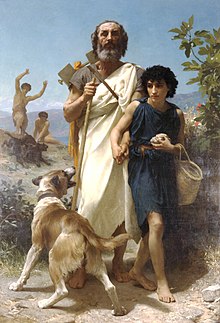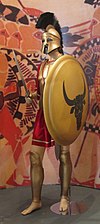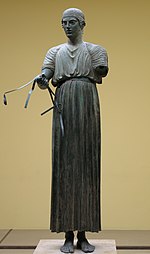Homer The history | The date of Homer, and the transcription | References | Navigation menu"Homer""rogueclassicism: Homer a Woman?""Controversies in History: Date of Homer""Homer Biography - List of Works, Study Guides & Essays - GradeSaver""Homer""Homer buried in Ios island - Greeka.com"eeWorldCat Identities224924963n780956390000 0003 6354 151X11855333X189316026924005cb11907688f(data)90069675500279109b721f499-8caa-4442-a411-568807b144643520420000443699jn19981001474ITICCUCFIV18814000082457XX907843DA00258983w6qz9r2d
Ancient Greek poets
Greekepic poemsMycenaean cultureTrojan warGreek Dark AgealphabeticwomanlegendblindIoniaarchaeologicalHerodotusTrojan WarEratosthenes
Homer
Jump to navigation
Jump to search

Homer and his guide, by William-Adolphe Bouguereau (1825–1905)
Homer is the name of the Greek poet who wrote the epic poems the Iliad and the Odyssey.[1] These are the earliest works of Greek literature which have survived to the present day, and are among the greatest treasures of the ancient world. They are a product of Mycenaean culture. The Iliad tells the story of the Trojan war, which took place around 1190 BC. The manuscripts of Homer were written much later, probably later than 800 BC.
The history |
What makes the history of this period so difficult is that the Mycenaean civilization was followed by several hundred years of decline, from which little or no writing has survived. This period, the Greek Dark Age, ended around 800 BC, when once again we find Greek writing, though this time in their newly developed alphabetic script. Therefore, there is a distinct possibility that the Homeric epics had a life, perhaps a long life, as oral literature, spoken by story-tellers.
We know little about Homer, and the later Greeks also knew little about him. Some have doubted he was a real person; others think he was a woman.[2]
A legend, has it that he was a blind poet who lived in Ionia. There is no definite evidence for any of these ideas.
There is archaeological evidence that Troy existed. The site of Troy has been discovered, and excavated. Therefore, it is a fair guess that the epic began as a long oral poem based on the siege of Troy, but with details added and changed as time went on.[3] Virtually every feature of Homer's poetry is due to the economy forced on it by oral methods of composition.[4][5]
The date of Homer, and the transcription |
The date of Homer's existence is not known. Herodotus said that Homer lived 400 years before his own time, which would place him at around 850 BC;[6][7][8][9][10][11] but other ancient sources gave dates much closer to the time of the Trojan War.[12] The date of the Trojan War was given as 1194–1184 BC by Eratosthenes.
Today, "the date of Homer" means the date of the writing down the oral poems, rather than the life of Homer. This is called the transcription date. The language suggests that the earliest possible date for the transcription is 800 BC, and the latest possible date is 600 AD.[13]
References |
↑ "Homer". wsu.edu..mw-parser-output cite.citationfont-style:inherit.mw-parser-output .citation qquotes:"""""""'""'".mw-parser-output .citation .cs1-lock-free abackground:url("//upload.wikimedia.org/wikipedia/commons/thumb/6/65/Lock-green.svg/9px-Lock-green.svg.png")no-repeat;background-position:right .1em center.mw-parser-output .citation .cs1-lock-limited a,.mw-parser-output .citation .cs1-lock-registration abackground:url("//upload.wikimedia.org/wikipedia/commons/thumb/d/d6/Lock-gray-alt-2.svg/9px-Lock-gray-alt-2.svg.png")no-repeat;background-position:right .1em center.mw-parser-output .citation .cs1-lock-subscription abackground:url("//upload.wikimedia.org/wikipedia/commons/thumb/a/aa/Lock-red-alt-2.svg/9px-Lock-red-alt-2.svg.png")no-repeat;background-position:right .1em center.mw-parser-output .cs1-subscription,.mw-parser-output .cs1-registrationcolor:#555.mw-parser-output .cs1-subscription span,.mw-parser-output .cs1-registration spanborder-bottom:1px dotted;cursor:help.mw-parser-output .cs1-ws-icon abackground:url("//upload.wikimedia.org/wikipedia/commons/thumb/4/4c/Wikisource-logo.svg/12px-Wikisource-logo.svg.png")no-repeat;background-position:right .1em center.mw-parser-output code.cs1-codecolor:inherit;background:inherit;border:inherit;padding:inherit.mw-parser-output .cs1-hidden-errordisplay:none;font-size:100%.mw-parser-output .cs1-visible-errorfont-size:100%.mw-parser-output .cs1-maintdisplay:none;color:#33aa33;margin-left:0.3em.mw-parser-output .cs1-subscription,.mw-parser-output .cs1-registration,.mw-parser-output .cs1-formatfont-size:95%.mw-parser-output .cs1-kern-left,.mw-parser-output .cs1-kern-wl-leftpadding-left:0.2em.mw-parser-output .cs1-kern-right,.mw-parser-output .cs1-kern-wl-rightpadding-right:0.2em
↑ "rogueclassicism: Homer a Woman?". www.atrium-media.com.
↑ E. Bakker 1997. Poetry in speech: orality and Homeric discourse. Ithaca NY.
ISBN 0-8014-3295-2
↑ Parry, Milman 1971. The making of Homeric verse: the collected papers of Milman Parry. (ed Adam Parry) Oxford.
↑ Ong, Walter. Orality and literacy: the technologizing of the word. Methuen, London & N.Y. Milman Parry's discovery, p20–27.
↑ Herodotus 2.53.
↑ "Controversies in History: Date of Homer".
↑ GradeSaver. "Homer Biography - List of Works, Study Guides & Essays - GradeSaver". www.gradesaver.com.
↑ "Homer". www.nndb.com.
↑ http://webcache.googleusercontent.com/search?q=cache:NtFnt7Nod-0J:www1.pu.edu.tw/~bmon/Literature/Iliad.doc&cd=9&hl=en&ct=clnk&gl=us
↑ "Homer buried in Ios island - Greeka.com". Greeka.
↑ Graziosi, Barbara (2002). The invention of Homer. Cambridge. pp. 98–101.
↑ Nagy, Gregory (2001). Homeric poetry and problems of multiformity: the Panathenaic Bottleneck. 96. Classical Philology. pp. 109–119.
| Wikiquote has a collection of quotations related to: Homer |
Wikisource has original writing related to this article: Homer |
| Wikimedia Commons has media related to Homer. |
Category:
- Ancient Greek poets
(RLQ=window.RLQ||[]).push(function()mw.config.set("wgPageParseReport":"limitreport":"cputime":"0.464","walltime":"0.605","ppvisitednodes":"value":2233,"limit":1000000,"ppgeneratednodes":"value":0,"limit":1500000,"postexpandincludesize":"value":58500,"limit":2097152,"templateargumentsize":"value":2310,"limit":2097152,"expansiondepth":"value":13,"limit":40,"expensivefunctioncount":"value":0,"limit":500,"unstrip-depth":"value":1,"limit":20,"unstrip-size":"value":21680,"limit":5000000,"entityaccesscount":"value":1,"limit":400,"timingprofile":["100.00% 488.015 1 -total"," 54.76% 267.216 1 Template:Reflist"," 20.67% 100.856 1 Template:Citeweb"," 13.06% 63.748 1 Template:About"," 12.46% 60.812 2 Template:Cite_journal"," 10.92% 53.273 1 Template:ISBN"," 10.73% 52.370 1 Template:Commonscat"," 10.41% 50.809 2 Template:Citation/core"," 6.75% 32.926 1 Template:Authority_control"," 6.55% 31.974 1 Template:Wikiquote-en"],"scribunto":"limitreport-timeusage":"value":"0.163","limit":"10.000","limitreport-memusage":"value":4022131,"limit":52428800,"cachereport":"origin":"mw1299","timestamp":"20190702105444","ttl":2592000,"transientcontent":false););"@context":"https://schema.org","@type":"Article","name":"Homer","url":"https://simple.wikipedia.org/wiki/Homer","sameAs":"http://www.wikidata.org/entity/Q6691","mainEntity":"http://www.wikidata.org/entity/Q6691","author":"@type":"Organization","name":"Contributors to Wikimedia projects","publisher":"@type":"Organization","name":"Wikimedia Foundation, Inc.","logo":"@type":"ImageObject","url":"https://www.wikimedia.org/static/images/wmf-hor-googpub.png","datePublished":"2004-07-17T10:17:47Z","dateModified":"2019-05-28T17:22:58Z","image":"https://upload.wikimedia.org/wikipedia/commons/0/0b/William-Adolphe_Bouguereau_%281825-1905%29_-_Homer_and_his_Guide_%281874%29.jpg","headline":"ancient Greek epic poet, traditionally considered as the author of the Iliad and the Odyssey"(RLQ=window.RLQ||[]).push(function()mw.config.set("wgBackendResponseTime":113,"wgHostname":"mw1326"););

